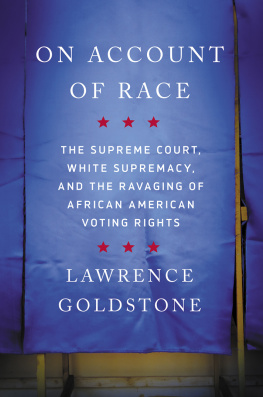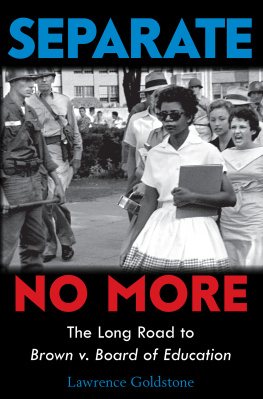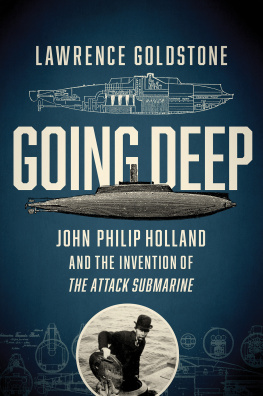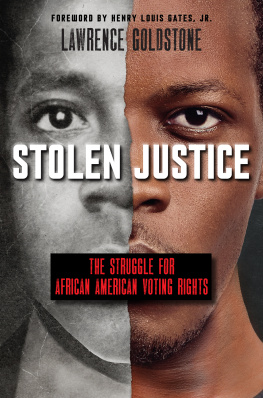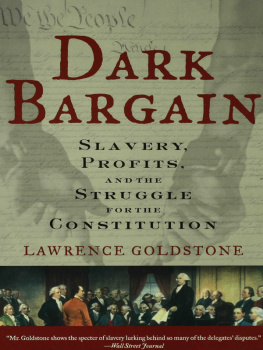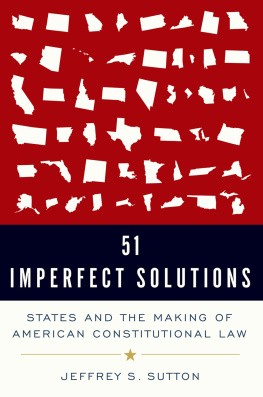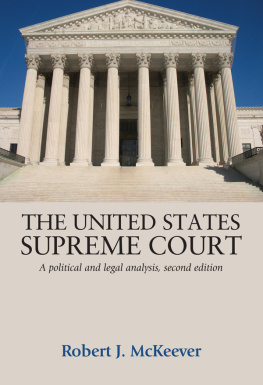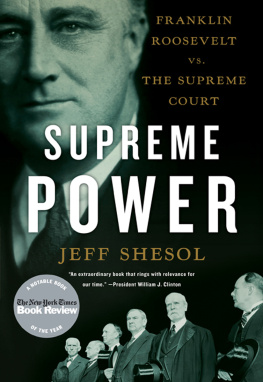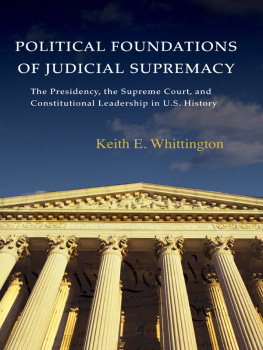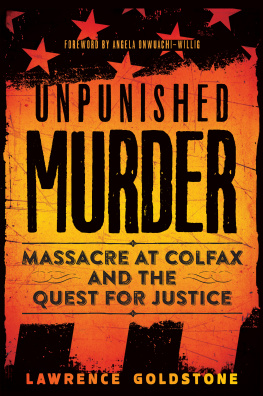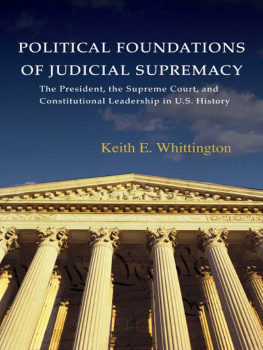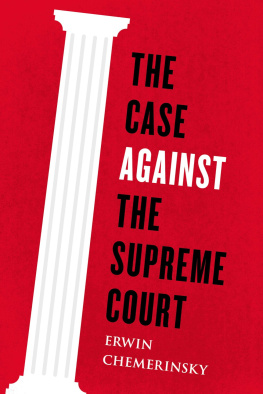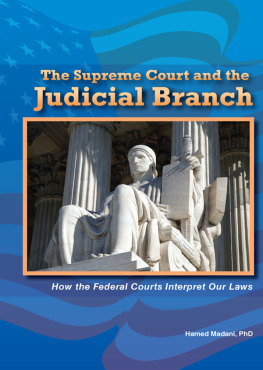Contents
Guide
Additional Praise for On Account of Race
Lawrence Goldstones book On Account of Race is a careful and brilliant analysis of the effort of the Southern states to deprive the African American population of the right to vote after Reconstruction ended in 1877. There was no disguise of their purpose and no restriction on the method they used. From the grandfather clause or poll taxes or literacy tests, whatever could be used to block African Americans from voting was openly and emphatically applied. The white population was simply determined to keep the ballot box for themselves. Goldstone shows how the courts refused to interfere in any way with this program. Even such noteworthy judges as Justice Oliver Wendell Holmes approved the effort. The book carefully examines the campaign, which lasted almost one hundred years until the Voting Rights Act of 1965.
LEON FRIEDMAN, Joseph Kushner Distinguished Professor of Civil Liberties Law at Hofstra University
In a book both reasonable and readable, Lawrence Goldstone effectively challenges the convenient mythology that racial segregation was a policy reflecting merely the isolated prejudices of the southern American states in the postCivil War era. His main focus is the U.S. Supreme Court and the peculiar, absurdly twisted logic across a series of critical cases by which the justices undermined the Fourteenth and Fifteenth Amendments, systematically legitimating Jim Crow. The lesson is clear: that voting and other basic rights, unless broadly defended, can rest on fragile foundations indeed.
RONALD KING, professor of political science at San Diego State University and coauthor of Removal of the Property Qualification for Voting in the United States

ALSO BY LAWRENCE GOLDSTONE
Inherently Unequal: The Betrayal of Equal Rights by the Supreme Court, 18651903
The Activist: John Marshall, Marbury v. Madison, and the Myth of Judicial Review
Dark Bargain: Slavery, Profits, and the Struggle for the Constitution
Stolen Justice: The Struggle for African American Voting Rights (For young adults)
Unpunished Murder: Massacre at Colfax and the Quest for Justice (For young adults)

On Account of Race
Copyright 2020 by Lawrence Goldstone
First hardcover edition: 2020
All rights reserved under International and Pan-American Copyright Conventions. No part of this book may be used or reproduced in any manner whatsoever without written permission from the publisher, except in the case of brief quotations embodied in critical articles and reviews.
Library of Congress Cataloging-in-Publication Data
Names: Goldstone, Lawrence, 1947 author.
Title: On account of race : the Supreme Court, white supremacy, and the ravaging of African American voting rights / Lawrence Goldstone.
Description: Berkeley : Counterpoint Press, 2020. | Includes bibliographical references and index.
Identifiers: LCCN 2019037734 | ISBN 9781640093928 (hardcover) | ISBN 9781640093935 (ebook)
Subjects: LCSH: Race discriminationLaw and legislationUnited StatesHistory19th century. | Race discriminationLaw and legislationUnited StatesHistory20th century. | African AmericansSuffrageHistory19th century. | African AmericansSuffageHistory20th century.
Classification: LCC KF4755 .G65 2020 | DDC 342.7308/73dc23
LC record available at https://lccn.loc.gov/2019037734
Jacket design by Sarah Brody
Book design by Jordan Koluch
COUNTERPOINT
2560 Ninth Street, Suite 318
Berkeley, CA 94710
www.counterpointpress.com
Printed in the United States of America
Distributed by Publishers Group West
10987654321
To Nancy and Lee
Courts of law will give the sense of every article of the constitution that may from time to time come before them. And in their decisions they will not confine themselves to any fixed or established rules, but will determine, according to what appears to them, the reason and spirit of the constitution. The opinions of the supreme court, whatever they may be, will have the force of law; because there is no power provided in the constitution that can correct their errors or control their adjudications. From this court there is no appeal.
BRUTUS, writing against ratification of the Constitution, January 31, 1788
CONTENTS

O N MARCH 7, 1965, 600 MEN AND WOMEN SET OUT from a church in Selma, Alabama, on a planned fifty-four-mile march to the state capital in Montgomery. They were led by two black men: John Lewis, the twenty-five-year-old son of an Alabama sharecropper, and Hosea Williams, who had a masters degree in chemistry and had been wounded in action in World War II while serving in General George S. Pattons Third Army.
In Montgomery, they intended to present Governor George Wallace with petitions demanding that African Americans be guaranteed the same constitutionally protected right to vote that whites in Alabama regularly and easily exercised. In Selma, only about 300 of the more than 15,000 eligible black voters had been allowed to register.
When the marchers reached the crest of the Edmund Pettus Bridgewhich spanned the Alabama River and had been named for a Confederate general who had also been a Grand Dragon of the Alabama Ku Klux Klanthey saw dozens of white-helmeted state troopers waiting for them on the other side. The troopers were slapping nightsticks in their hands; whips and tear gas canisters hung from their belts; gas masks were at the ready. The Dallas County sheriff, Jim Clark, and his deputies, some on horseback, waited behind the troopers. Dozens of jeering white spectators waving Confederate flags were on the scene as well.
John Cloud, a major in the state police, spoke through a bullhorn and demanded that the marchers turn back. He gave them two minutes. Lewis, the leader of the Student Nonviolent Coordinating Committee, and Williams, of the Southern Christian Leadership Conference, were determined not to back down. They were equally insistent that the protest be peaceful, at least on their end. They instructed the marchers to kneel and pray and to not fight back if attacked.
And attacked they were, almost immediately. Viciously, and with fury and hate. Lewis and his fellow marchers were tear-gassed, beaten with nightsticksLewis suffered a fractured skullwhipped, and run down by horses. Many were spat on as they lay injured on the ground.
There had been any number of incidents of white brutality across the South, but this one was filmed by reporters for the entire world to see. On the ABC network, the television premiere of Judgment at Nuremberg, about the trials of Nazi war criminals, was interrupted so that millions could witness the horrible violence in Selma for themselves. The incident was soon dubbed Bloody Sunday, and within days, demonstrations against Southern racism were held in more than eighty U.S. cities.
Finally, after decades of denial, the government acted. On March 15, President Lyndon Johnson appeared before a special joint session of Congress and told the assembled senators and representatives:
Next page
